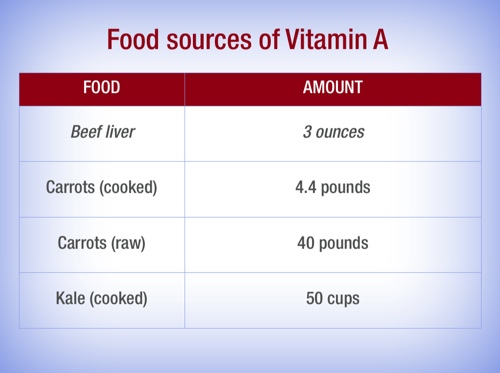Why You Can’t Get Vitamin A From Eating Vegetables

There’s a common misconception that beta-carotene found in fruits and vegetables is the same thing as vitamin A. It’s not.
Beta-carotene is the precursor (inactive form) of retinol, the active form of vitamin A. While beta-carotene is converted into vitamin A in humans, only 3% gets converted in a healthy adult. And that’s assuming you’re not one of the 45% of adults that don’t convert any beta-carotene into vitamin A at all.
This means that – contrary to popular wisdom – vegetables like carrots and red peppers are not adequate food sources of vitamin A.
Vitamin A is found in significant amounts only in animal products like liver and grass-fed dairy. You’d have to eat a huge amount of beta-carotene from plants to meet vitamin A requirements during pregnancy. For example, 3 ounces of beef liver contains 27,000 IU of vitamin A. As the chart below illustrates, to get the same amount of vitamin A from plants (assuming a 3% conversion of beta-carotene to vitamin A), you’d have to eat 4.4 pounds of cooked carrots, 40 pounds of raw carrots, and 50 cups of cooked kale!
And remember: that’s assuming you’re not one of the 45% of people that don’t convert any beta-carotenes into retinol at all!
Obviously, since we only eat 3-5 pounds of food per day on average, vegetables aren’t a viable food source of vitamin A.
Why does this matter? Because vitamin A plays several crucial roles in reproductive health, and many women (and men) don’t get enough of it because vitamin A rich foods like liver and raw dairy aren’t commonly consumed anymore.
I’ll cover the importance of vitamin A in more detail in a future post about cod liver oil, which is one of the best sources of naturally occurring vitamin A.
